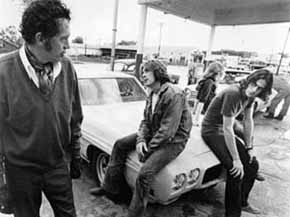Sole Criterion: Two-Lane Blacktop
By Brett Ballard-Beach
March 1, 2012
The only main character in Two-Lane Blacktop not discussed to this point is perhaps the most important and certainly the most enigmatic: the driver of the GTO who lays down the challenge to the others. As embodied by character actor Warren Oates in one of his few lead roles, he is a contradiction embedded in an enigma. He talks the most of any of them, but his stories always cancel each other, suggesting the American capacity for reinvention pushed to its most annihilating extremes.
Depending on his audience, he is a businessman on leave, an auto tester, or a NASA employee, with "connections" in Chicago, NYC, and Southern Florida. His history shifts like the gears in his car until it can only be ascertained that he is as lost in America as The Mechanic, the Driver, and The Girl. Wurlitzer’s screenplay identifies him as an aging frat house type, which was precisely the phrase that came to my mind. Imagine Will Ferrell’s character from Old School fused with the intensity of an early '90s Michael Rooker performance and that can at least point you in the right direction. Oates is somehow able to simultaneously suggest easygoing and barely contained, a preppie past his prime (he is wearing a different colored sweater every time we encounter him) with a fading baby face, whose air of bluster is only surface deep. He winds up spending as much time in the company of the others as he does “racing” them and it becomes apparent that he needs them as much as they seem they could care less about him. (A scene in a southern diner where he defuses a sticky situation with some locals by pretending to be the manager of The Driver and the Mechanic speaks to the would-be family unit that is almost achieved by the quartet.) My own personal feeling is that all of them are part of what would be considered Nixon’s "Silent Majority," out of step with the 1960s counterculture that has just passed and uncertain how they fit in with the dawning of a new decade.
Tying this back into my idea of how the film swerves from the obvious is the fact that GTO is not made to be the buffoon or the antagonist simply because he is older, patriarchal, unhip, or out of step with the times like the father in a terrible Disney comedy of the period. It is almost easier to feel a little more sympathy for GTO than the others (not that the film pushes it) by virtue of his obvious foundering. As Two-Lane Blacktop slowly morphs into something other than just a race for pink slips, it resists the urge to acquire meaning through some kind of trendy violent/tragic/nihilistic ending. Hellman guides it towards a definitive conclusion, perhaps the most cinematically appropriate one possible, and even then manages to bypass the idea that it should be read simply as a metaphor, or a slick bit of reflexivity. A line of dialogue that didn’t make it into the film has an exasperated Girl unloading on the driver:
“You make me uptight.”
“Yeah, . . . why is that?”
“You never say anything. I mean I dig you and all, but you’re not letting anyone into your movie.”
As Hellman’s final shot suggests, silence can be its own prison and, one way or another, every film comes to an end.
Next time: My first column in which I encounter a Criterion release for the first time. Antonioni in the 1980s. DVD Spine # 585
Continued:
1
2
3
4
|
|
|
|




